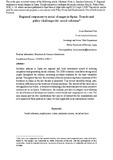Regional responses to social changes in Spain. Trends and policy challenges for social cohesion
Fecha
2020Versión
Acceso abierto / Sarbide irekia
Tipo
Artículo / Artikulua
Versión
Versión aceptada / Onetsi den bertsioa
Impacto
|
|
10.1111/rsp3.12330
Resumen
Inclusion policies in Spain are regional and local instruments aimed at reducing inequalities and generating social cohesion. The 2008 economic crisis had a strong social impact throughout the country, increasing exclusion situations for the most vulnerable groups. Throughout this text, the evolution of social inclusion regulatory measures of five territories in Spain in the last decade is presen ...
[++]
Inclusion policies in Spain are regional and local instruments aimed at reducing inequalities and generating social cohesion. The 2008 economic crisis had a strong social impact throughout the country, increasing exclusion situations for the most vulnerable groups. Throughout this text, the evolution of social inclusion regulatory measures of five territories in Spain in the last decade is presented. This review identifies strong inter-territorial differences in the treatment of social problems. The interest of this work lies in two significant novelties. In terms of methodology, this work analyses the main normative instruments on inclusion. Furthermore, the analysis provides an integral view allowing the identification of development models, current trends and responses to the crisis. The conclusions provide five contributions that may be of interest for the consolidation and development of these policies in Spain, but also applicable in an international context. [--]
Materias
Crisis,
Employment,
Minimum income,
Social cohesion,
Social services
Editor
Wiley Regional Science Association International
Publicado en
Regional Science Policy and Practice, 2020, 1– 16
Departamento
Universidad Pública de Navarra. Departamento de Sociología y Trabajo Social /
Nafarroako Unibertsitate Publikoa. Soziologia eta Gizarte Lana Saila
Versión del editor
Entidades Financiadoras
This work was supported by the Spanish Ministry of Economy and Competitiveness under grant (CSO2014–51901‐P).






